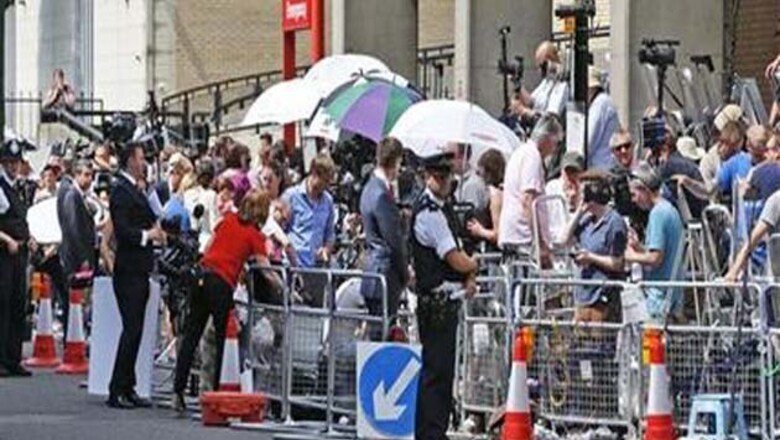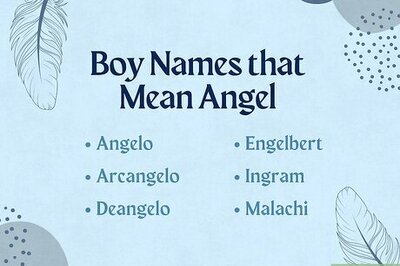
views
The arrival of a new royal baby imbued the pomp and pageantry of Buckingham Palace with an extra sense of history on Monday as thousands of reporters, Londoners and tourists awaited the most anticipated birth announcement in years.
Patient well-wishers held a 12-hour vigil, many of them craning for a better view and a photograph of the palace gates, where the official bulletin announcing the birth was posted on an easel. Grown men rode on friends' shoulders. Others used step ladders.
Outside the hospital where the Duchess of Cambridge gave birth to the boy, a man dressed as a town crier in traditional robes and an extravagant feathered hat shouted the news and rang a bell.
The car carrying the announcement drove from the hospital to the palace, where it was greeted by a crowd shouting "Hip! Hip! Hooray!" and singing "For He's a Jolly Good Fellow" while waving Union Jack flags.
David Etrillard, visiting from France, said the French "look at Britain with interest because we have no monarchy so it's great for us. I'm so happy it happened while me and my family are on holiday here."
The baby boy will be third in line to the throne behind Prince Charles and Prince William and is likely to be monarch one day.
The birth announcement on Buckingham Palace letterhead was brought out for public inspection on the easel by Badar Azim, a footman with the royal household, and Ailsa Anderson, the queen's press secretary, before being taken inside.
The easel was previously used to announce William's birth in 1982. The framed sheet of paper suddenly became the target of a thousand camera flashes when a sea of people thrust their smartphones through the railings. Hours after the initial announcement, crowds were still surging forward to get near the easel.
They no longer wield political power, but Britain's royals are unsurpassed as celebrities and cultural icons.
"They're sort of the celebrities of the world," said Anne Frey, a beautician from Madison, Wis., watching the daily changing-of-the-guard ceremony with her husband.
"We can tell our kids one day that we were here when it happened," said Jill Muencz, a tourist from Cleveland, Ohio. "It's fantasy. We don't get to experience all that" as Americans.
The birth of a future monarch added to British sports successes at Wimbledon, the Tour de France cycling race and in the Ashes cricket competition.
Few Britons were willing to go as far in their royalism as Terry Hutt, a carpenter from Cambridge in eastern England, who camped outside the hospital for 12 days, sleeping outside the hospital on a bench covered with a Union Jack blanket.
Hutt, who is proud to have met every royal from the late Queen Mother on, said he was doing his bit for Britain by camping outside the hospital in his red, white and blue Union Jack suit, holding flags and congratulatory banners.
"To me, the royal family play a very, very important role," he said. "Visitors from all over the world haven't got a king and queen. It's a plus for us."
As London commuters rushed past the hospital to work, Pascal Faure, a maintenance contractor originally from South Africa, stopped to snap a picture on his phone for friends at home and in Australia.
"It's part of their heritage, I guess, their culture," said Faure, who claimed his own tenuous royal connection: "Apparently my third cousin once removed is Chelsy" Davy, Prince Harry's former girlfriend.
He also had more insight than most into the 5,000-pound ($8,000) -a-night private wing where the child was born. He fixed the air conditioning there last week - a good thing, too, as Monday was expected to be the hottest day of the year in London.
The outpouring of affection for the royal infant is a sign of how thoroughly Britain's royal family has rebuilt its image since the low point that followed the death of Princess Diana in a car crash in 1997. Diana had been popular, glamorous and - in the eyes of many - badly treated by the royal "Firm."
Sixteen years on, support for the monarchy is riding high after William and Kate's 2011 wedding and last year's Diamond Jubilee celebrations for Queen Elizabeth II's 60 years on the throne.
For non-Britons, the emergence of an attractive young generation that includes William, Kate and soldier-socialite Prince Harry has given the clan a mix of glamour and celebrity that is hard to resist.
"We like to pretend we have a king and queen," said Maddie Cruse, from Helena, Montana, as she stood outside the palace. "Since we don't have a king and queen, we borrow yours."




















Comments
0 comment